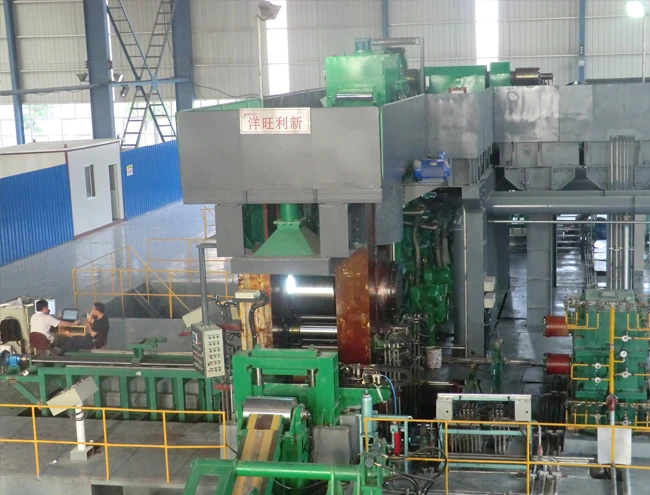
Roll Bonding Cladding: High Strength, Corrosion-Resistant
Roll Bonding Cladding is a key solution in the manufacturing industry, specifically within Special Equipment Manufacturing Industry and Manufacturing of metallurgical specialized equipment. This article explores how Beijing Yang Wang Li Xin Sci&Tech Co.,Ltd. supports professionals with durable, high-performance products, and explains why this product is an ideal choice for businesses in these sectors.

Table of Contents
- Roll Bonding Cladding Overview
- Benefits & Use Cases of Roll Bonding Cladding in Manufacturing of metallurgical specialized equipment
- Cost, Maintenance & User Experience
- Sustainability & Market Trends in manufacturing
- Conclusion on Roll Bonding Cladding from Beijing Yang Wang Li Xin Sci&Tech Co.,Ltd.
Roll Bonding Cladding Overview
Roll Bonding Cladding is a solid-state metallurgical process that bonds a corrosion- or wear-resistant alloy layer to a structural base plate through compressive rolling. In hot roll bonding cladding, stacked and edge-welded “packs” of dissimilar metals are heated, then passed through a precision mill to break surface oxides and create a permanent atomic bond without melting. The result is a bimetal or trimetal plate that delivers the strength of carbon or low-alloy steel with the surface performance of stainless steel, nickel alloys, titanium, or other specialty metals. For metallurgical specialized equipment, this method ensures uniform bond integrity, reliable thickness control, and high productivity versus weld overlay.
Beijing Yang Wang Li Xin Sci&Tech Co.,Ltd. engineers cladding rolling mills that support demanding production cells: robust 4‑high/6‑high stands, automatic gauge control, work-roll bending, advanced surface preparation, and inline NDT integration (e.g., UT readiness) to help producers validate bond quality and plate soundness to recognized standards. A recent project for a pressure-vessel fabricator used roll-bonded 316L/SA516 plates to replace solid stainless, cutting alloy consumption while maintaining corrosion resistance—demonstrating the process’s technical and economic advantages for B2B decision makers.
Benefits & Use Cases of Roll Bonding Cladding in Manufacturing of metallurgical specialized equipment
Across steelmaking, nonferrous smelting, petrochemical, and energy equipment, roll-bonded clad plate enables durable vessels, columns, autoclaves, heat exchangers, scrubbers, pickling lines, and slurry-handling components. Clad plate is also formed and longitudinally welded into CRA-lined pipe; in these projects, clad pipe welding procedures preserve the corrosion-resistant layer while ensuring robust seam integrity and low dilution. For thick-section applications, hot roll bonding cladding delivers high bond strength and uniformity, reducing risk in severe service environments such as high temperature, sour service, or chloride-rich media.
- Competitive advantages: lower alloy consumption vs. solid CRA, superior bond continuity vs. overlay, excellent flatness and plate yield, and predictable weldability in downstream fabrication.
- Application highlights: desulfurization absorbers (duplex/CS), urea and nitric acid equipment (stainless/CS), hydromet autoclaves (Ni alloy/CS), and corrosion‑resistant pipelines using formed-and-welded clad plate.
- Beijing Yang Wang Li Xin Sci&Tech Co.,Ltd. provides process know-how, mill design, and commissioning support to help producers hit target bond quality, thickness tolerance, and throughput with reduced scrap.
Cost, Maintenance & User Experience
Total cost of ownership favors roll-bonded clad plate because a thin corrosion-resistant layer achieves the same service life as a thick solid alloy plate—cutting alloy purchases, lead times, and embodied nickel content. Producers report improved material yield from precise thickness control and flatter plates, while end-users benefit from longer maintenance intervals, fewer unplanned shutdowns, and easier inspection regimes. For fabricators, predictable welding behavior of the base metal and CRA layer simplifies procedures and reduces rework in vessel and clad pipe welding lines.
- ROI drivers: alloy savings vs. solid CRA, reduced overlay labor, higher throughput, and superior uptime in service. Many projects see payback within typical capital planning windows.
- Customer feedback from Special Equipment Manufacturing Industry users highlights consistent bond integrity (validated via UT and shear testing), stable forming behavior, and reliable weldability—key to delivering on schedule and spec.
Sustainability & Market Trends in manufacturing
Sustainability imperatives and stricter regulations are accelerating adoption of Roll Bonding Cladding. By minimizing the use of critical and high-CO2 alloys while delivering equal or better service life, clad plate supports decarbonization strategies and responsible sourcing. Growing markets—LNG, hydrogen, CCUS, desalination, and battery metals—demand equipment that resists corrosion and erosion without prohibitive cost or environmental footprint. Specifications increasingly reference clad solutions to balance lifecycle performance and ESG goals.
- Beijing Yang Wang Li Xin Sci&Tech Co.,Ltd. integrates process efficiency, digital controls, and quality assurance into cladding rolling mills to help producers reduce scrap, energy per ton, and rework.
- As a forward‑thinking partner, the company aligns equipment capabilities with emerging standards and market needs, enabling clients to scale production of high‑integrity clad plates for future-ready infrastructure.
Conclusion on Roll Bonding Cladding from Beijing Yang Wang Li Xin Sci&Tech Co.,Ltd.
Roll Bonding Cladding empowers manufacturers in the Special Equipment Manufacturing Industry to deliver corrosion-resistant, cost-effective, and durable solutions for metallurgical and process applications. From hot roll bonding cladding of thick plates to downstream clad pipe welding, the approach reduces alloy use, elevates performance, and streamlines fabrication. Beijing Yang Wang Li Xin Sci&Tech Co.,Ltd. is a trusted partner, providing engineered cladding rolling mills and application know-how to ensure repeatable, spec-compliant output. Contact us: email: Alley.wang@bjywlx.com. Visit our website: https://www.bjywlx.com
-
YWLX’s 1450mm Six-Hi Reversing Mill Goes Live in BangladeshNewsNov.24,2025
-
Adjusting Roll Gap in 6Hi Reversing Cold Rolling Mill for Thin StripNewsNov.13,2025
-
Quality Control Standards for Automatic Gauge Control in Strip RollingNewsNov.13,2025
-
Effect of Skin Pass Rolling on Metal DuctilityNewsNov.13,2025
-
Key Components of a Modern TempermillNewsNov.13,2025
-
Common Wear Patterns of Work Roll in Tandem Cold Mill OperationsNewsNov.13,2025
-
Revolutionary Skin Pass Rolling Technology for Enhanced Steel QualityNewsNov.04,2025










